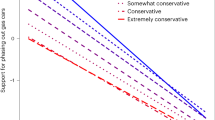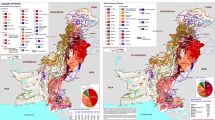Abstract
This paper examines social responses to the 1973–1974 gasoline crisis in the United States, using newspaper reports of automobile driver behavior in two metropolitan areas and American Automobile Association data on the adoption of rationing plans and the availability of gasoline in 48 states. From these data it is possible to identify two types of responses: individual responses by automobile drivers, which occurred in every region affected by the shortages, and collective responses in the form of rationing plans adopted by governments and gas station operators in the regions with the most severe shortages. In the latter regions the responses occurred in sequence, with individual responses emerging first and collective responses developing later.
Similar content being viewed by others
References
American Automobile Association (1974). Fuel Gauge Reports, January–March.
Dawes, R. M. (1973). The commons dilemma: An N-person mixed motive game with a dominating strategy for defection.Oregon Research Institute Bulletin 13: 1–12.
Edney, J. J., and Harper, C. S. (1978). The effects of information in a resource management problem: A social trap analog.Human Ecology 6(4): 387–395.
Edney, J. J., and Cass, R. C. (1978). The commons dilemma: A simulation testing the effects of resource visibility and territorial division.Human Ecology 6(4): 371–386.
Erikson, K. T. (1976).Everything in Its Path: Destruction of Community in the Buffalo Creek Flood. Simon and Schuster, New York.
Hirschman, A. O. (1970).Exit, Voice, and Loyalty: Responses to Declines in Organizations, Firms, and States. Harvard University Press, Cambridge, Mass.
Hirschman, A. O. (1976). Comment.American Economic Review 66(May): 386–389.
Honnold, J. A., and Nelson, L. D. (1978). Structural and situational determinants of conservation: An analysis of consumer response to the 1977 fuel crisis. Paper presented at the annual meetings of the American Sociological Association, San Franciso.
MacArthur, R. H. (1972).Geographical Ecology: Patterns in the Distribution of Species. Harper and Row, New York.
McCay, B. J. (1978). Systems ecology, people ecology, and the anthropology of fishing communities.Human Ecology 6(4): 397–422.
Murray, J. L., Minor, M. J., Bradburn, N. M., Cotterman, R. F., Frankel, M., and Pisarski, A. E. (1964). Evolution of public response to the energy crisis.Science 184 (April 19): 257–263.
Oakland, W. H. (1972). Congestion, public goods and welfare.Journal of Public Economics 1: 339–357.
Olson, M., Jr. (1971).The Logic of Collective Action: Public Goods and Public Policy, 2nd Ed., Schocken, New York.
Quarentelli, E. L., and Dynes, R. R. (1977). Response to social crisis and disaster. In Inkeles, A. (ed.),Annual Review of Sociology, Annual Reviews, Palo Alto, pp. 23–50.
Rokkan, S. (1974). Entries, voices, exits: Towards a possible generalization of the Hirschman model.Social Science Information 13(1): 39–53.
Vayda, A. P. (1976).War in Ecological Perspective. Plenum, New York.
Author information
Authors and Affiliations
Rights and permissions
About this article
Cite this article
Rudel, T.K. Social responses to commodity shortages: The 1973–1974 gasoline crisis. Hum Ecol 8, 193–212 (1980). https://doi.org/10.1007/BF01561024
Issue Date:
DOI: https://doi.org/10.1007/BF01561024




